Kevin Clarke
Operetta Research Center
23 January, 2018
The Geschwister Pfister – a German-Swiss-Croatian comedy trio – have written operetta history, many times over. Yes, they were the driving force behind the famous Im weißen Rössl at Bar jeder Vernunft in 1994, with its all-star cast preserved on DVD. But they have done much more. To name a few highlights, Christoph Marti was the leading lady in Emmerich Kálmán’s Csardasfürstin at Cologne Opera, he was also a ravishing blonde bombshell Clivia at Komische Oper Berlin. In both productions, Andreja Schneider had lead roles too, and at the Opera St. Gallen in Switzerland Tobias Bonn starred as the male lead, Count Tassilo, in Gräfin Mariza. Currently, all three are in the revival of Paul Linke’s science fiction operetta Frau Luna at Tipi am Kanzleramt: a show about sexual liberties enjoyed while taking a walk on the dark side of the moon, where Miss Schneider rules supreme as the lusty godess of the moon. That production is a great example of a newly rediscovered joy in cross-dressing and gender bending in operetta, with Christoph Marti playing Frau Pusebach, Katharina Thalbach appearing as Prinz Sternschnuppe and Fausto Israel as Venus. For a long time, this core element of original operetta had fallen out of favor. Recall the many attempts to turn Prince Orlofsky in Die Fledermaus into a tenor, because that supposedly made the genre more “serious” and “realistic.” Erich Wolfgang Korngold started the trend in the 1920s when he re-wrote Fledermaus for Max Reinhardt and had Oscar Karlweiß as Orlofsky; later such unlikely people as Wolfgang Windgassen took on the role. (Available on disc, with Karl Böhm conducting.) Today, it seems, audiences and operetta producers are enjoying the original “horrible prettiness” and “satanic subversiveness” once more that Robert C. Allen outlines in his book. Two members of the Geschwister Pfister team came to the Schwules Museum in Berlin this week to discuss the phenomenon, and to talk about their future operetta plans involving a cross-dressed Ball im Savoy in Nuremberg, among other things.
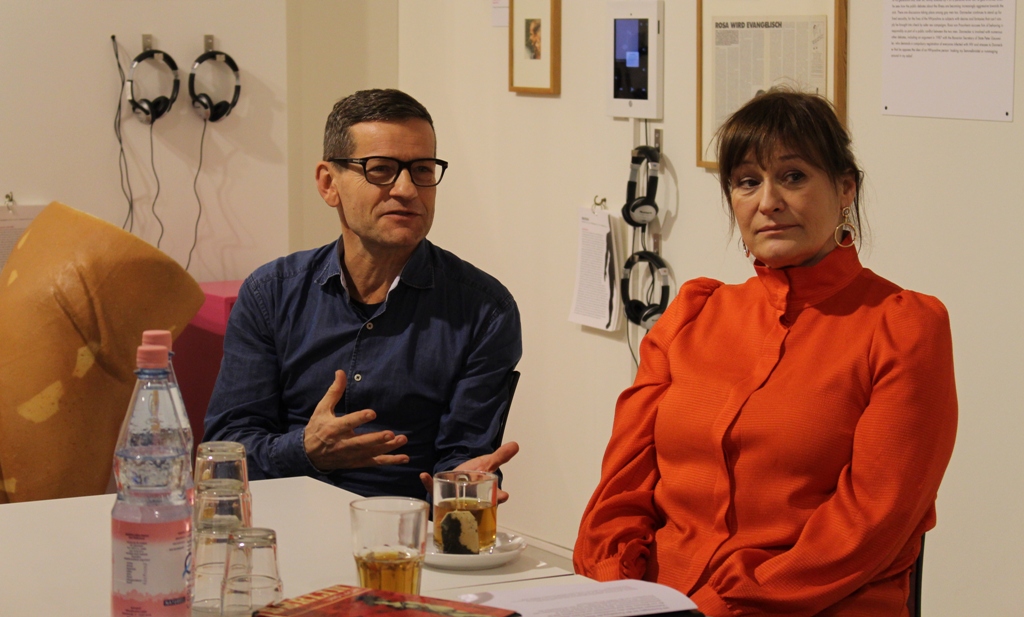
Christoph Marti (l.) and Andreja Schneider at Schwules Museum. (Photo: Juan Carlos Rosa)
The reason for the public talk was a special moon constellation: while Frau Luna opened at Tipi, the museum opened a film series called 12 Moons which presents “queer feminist positions.” In Queer Theory, the aspects of “gender” (as socially constructed), “sex” (as a supposedly biological category) and “sexual desire” are examined. And feminism obviously asks about women’s role in a world with male dominated power structures. These are aspects that are deeply linked with operetta which has a long tradition of playing with gender norms and of showcasing sexual desire outside of accepted social norms … and of having strong independent leading ladies who do as they like and grab what they want. (Think of Offenbach’s Grand Duchess of Gerolstein.)
For the talk, Vera Hofmann joined the discussion, she is the curator of the 12 Moons series. She said her aim with 12 Moons was to ask “what it means to be female,” what a “specific female gaze” is, and whether “men” and “trans* people” are included in this queer feminist debate.
To which Christoph Marti immediately replied that his Luna character Frau Pusebach is “extremely feminist”: “Pusebach would like to be independent, but that’s difficult, because she lives in a time [1899] in which most people have to work hard and get little pay, she is widowed, has to sublet her apartment, at the same time she longs for luxury …. which is why she’s chasing Mr. Panneke; not because he’s such a great guy, but because he has a pension. But that’s not enough for her. Because she has a well functioning libido, she runs around the Tiergarten at night, looking for love and affection. I consider that rather brave, militant even. She’s willing to take risks, she’s no passive housewife who sits around and waits for happiness to arrive, she goes out and grabs it in the dark on a park bench while there’s a lunar eclipse.”
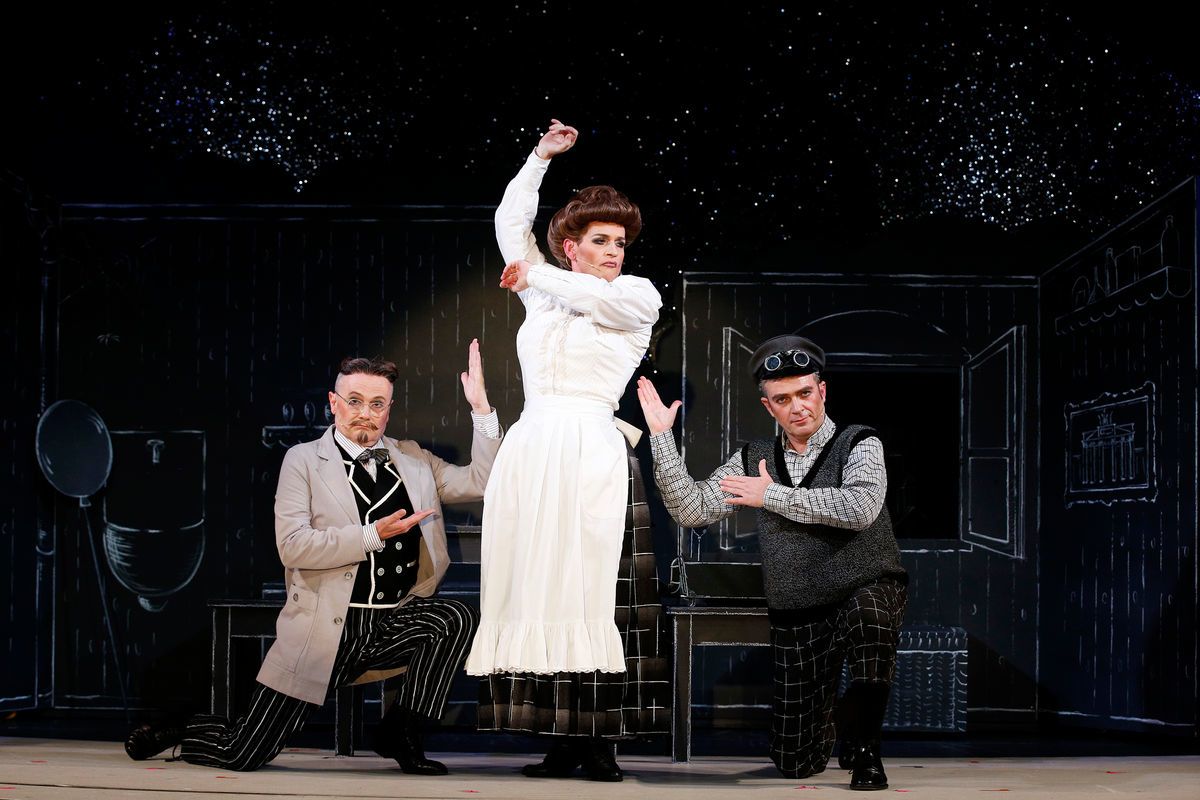
Christoph Marti as Pusebach (middle), with Thomas Pigor and Benedikt Eichhorn in “Frau Luna” at Tipi am Kanzleramt. (Photo: Barbara Braun)
Andreja Schneider ads that her character is similar: “She also wants adventure, she also wants a full life. She’s a widow, too, though no one knows what happened to her husband. She’s the ruler of the moon, throwing a non-stop party there. Maybe that has something to do with her former husband, maybe she thinks now that he’s finally dead she can do as she pleases. She longs for companionship, she wants a partner, but she’s not willing to give up her independence. She’s very emancipated, and very independent. And that makes her very modern.” The problem of combining independence and personal liberties with a desire for companionship and a partner (and possibly even children) is one most women around the globe face, it’s one of the issues many are trying to find answers to … also in operettas such as Frau Luna as a role model? (Or, if we stick to space adventures where humans travel to the moon to experiment in love and relationsship matters, Offenbach’s Le voyage dans la Lune from 1877.)
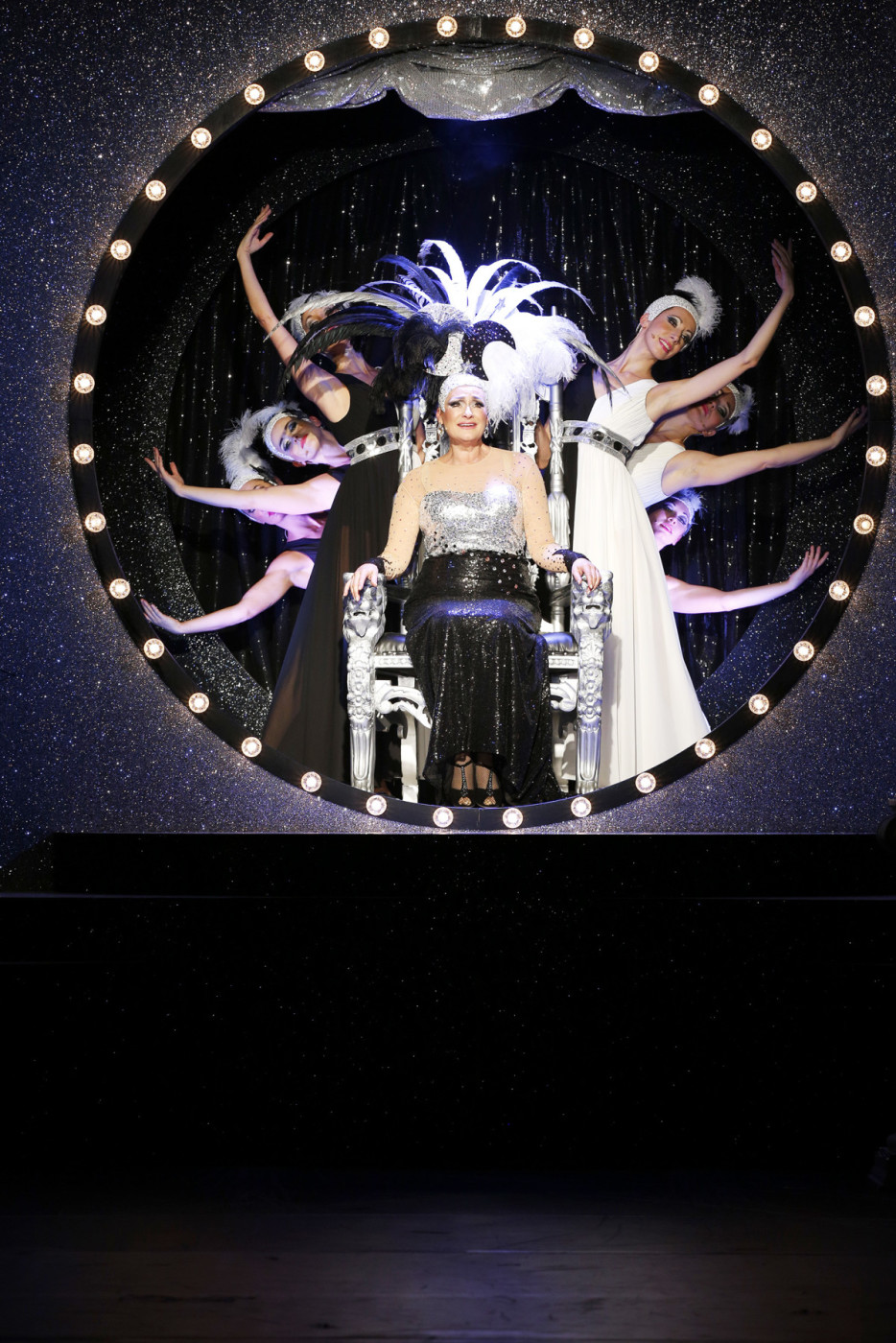
Andreja Schneider as the moon goddess in Paul Lincke’s “Frau Luna” at the Tipi am Kanzleramt, Berlin. (Photo: Barbara Braun)
When asked about the queer aspects of operetta, and their own performance style, Christoph Marti said that the Geschwister Pfister have been playing with gender elements from their earliest shows. “It’s an aspect that’s accompanied me my entire life,” said Christoph. “When I started as an actor at Schiller Theater in a Goldoni play, the director kept telling me to act more manly. It was grotesque, because I knew the second he said it that I could never do it. To tell the truth, I didn’t see my un-manliness as a deficit. On the contrary, the problem was that I was cast in the wrong roles. This changed at Schaubühne in a Luc Bondy production where I got to play a woman-in-green in a Botho Strauß play … and a door opened. From then on, many more doors opened. The breakthrough was a production in Munich where I played Uschi Glas at Residenztheater. We are talking about a ‘serious’ legitimate playhouse, not an mad-cap operetta stage. At the premiere, you didn’t have the cosmopolitan audience you find, today, at Komische Oper, but a very traditional Bavarian audience sitting there in evening dress and loden. My partner, Tobias, was there on opening night and told me that a couple in front of him didn’t blink all evening. When they got up, the husband said to his wife, ‘The best thing was the transvestite.’ Which was me as Uschi Glas, a well-known German film actress.”
This kind of positive reaction from more conservative circles was also evident in later Clivia performances in Berlin when the ‘normal’ audience attended and gave standing ovations to Christoph’s show stopping portrayal of a Hollywood diva in the jungle. “Maybe it has something to do with the fact that I don’t actually feel like a man anymore once I slip into such roles? Maybe it’s my female soul breaking free,” said Marti. And Andreja Schneider added, that when she’s on stage with Christoph she doesn’t see him as a man anymore either. For her, Marti becomes the character whose costumes he wears. And Christoph said that he’s seen Andreja in cross-dressed roles as well (e.g. in Shakespeare’s As You Like It) and would describe her as a “total butch guy” on stage, someone who goes far beyond “travesty.”
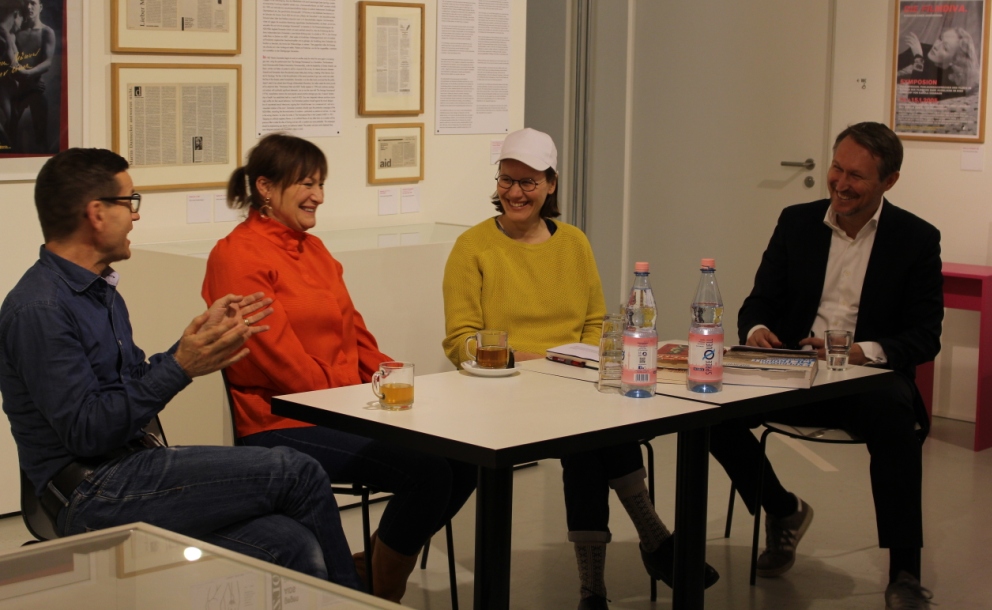
The “12 Moons” and “Frau Luna” discussion group (from left to right): Christoph Marti, Anreja Schneider, Vera Hofmann, Kevin Clarke. (Photo: Juan Carlos Rosa)
When Vera Hofmann presented recent research results about men dominating the film industry with 73 percent of all roles, reducing women to sidekicks, mostly shown in family or relationship situations, Christoph Marti said that these numbers didn’t fully reflect what’s happening. Because for him films are always about women. “If there are no interesting women in films, I don’t even bother going; the men are pure decoration, even if they outnumber the women.”
Andreja added that especially in operetta there are numerous great female roles, “probably because the actresses who premiered these shows – Hortense Schneider, Fritzi Massary etc. – were cool women who didn’t want to play submissive blondes. Instead, they dominated the stage and stole the lime light from their male counterparts. So for me, as a performer, it’s a blessing to slip into such roles because they are empowering.”
Because the Geschwister Pfister are often booked together for operetta projects, they can often work out the casting among themselves, making sure that everyone is happy with the role he/she gets. “This is a luxury, of course,” said Christoph, “to talk with Tipi or Barrie Kosky at Komische Oper about what we want to play, rather than just being offered a part. Young performers, just starting in the business, often don’t have that opportunity.”
One problem is that many theater directors don’t dare try something new in terms of casting, but also in terms of show titles. Many are worried that the audience won’t come if it’s not familiar with a title. It took Geschwister Pfister almost 10 years – and endless discussions with theater directors – until finally Barrie offered them the chance to stage Clivia. He had seen one of their shows and said to them: “I am going to be intendant of the Komische Oper, and I’d like you to do something like a Pfister show on my stage, only in extra-large.”
The idea of producing Dostal’s Clivia – which originally premiered at the end of 1933, after the take-over of the Nazis in Germany – put Kosky off, originally, because he said he couldn’t get his “Jewish heart” to accept such a piece. The Pfisters had already given up hope and were busy looking at other titles when Barrie came back and told them he had re-read the script and listened to the music and found Clivia should be put on, because there was no direct evidence of Nazi ideology.
This new willingness to take risks very much depends on the people at the head of theaters. Barrie Kosky is one glorious example, because resurrecting forgotten shows is “who he is, he couldn’t do it any other way.” That’s a blessing, for performers and audiences and operetta fans tired of the same old titles performed over and over again.
While the Komische Oper is a subsidized theater, which slightly reduces the risks of performing less well-known operettas, Tipi is an unsubsidized venue, “the people there wake up every morning having to come up with new ideas to fill their tent.” As Christoph explains, “That’s why the casting for Frau Luna is so brilliant, because they needed an all-star ensemble to sell tickets. Obviously, that’s how commercial operetta operated in the 19th and early 20th century, in Germany until 1933. But it’s not how operetta works today in most state funded theatres.”
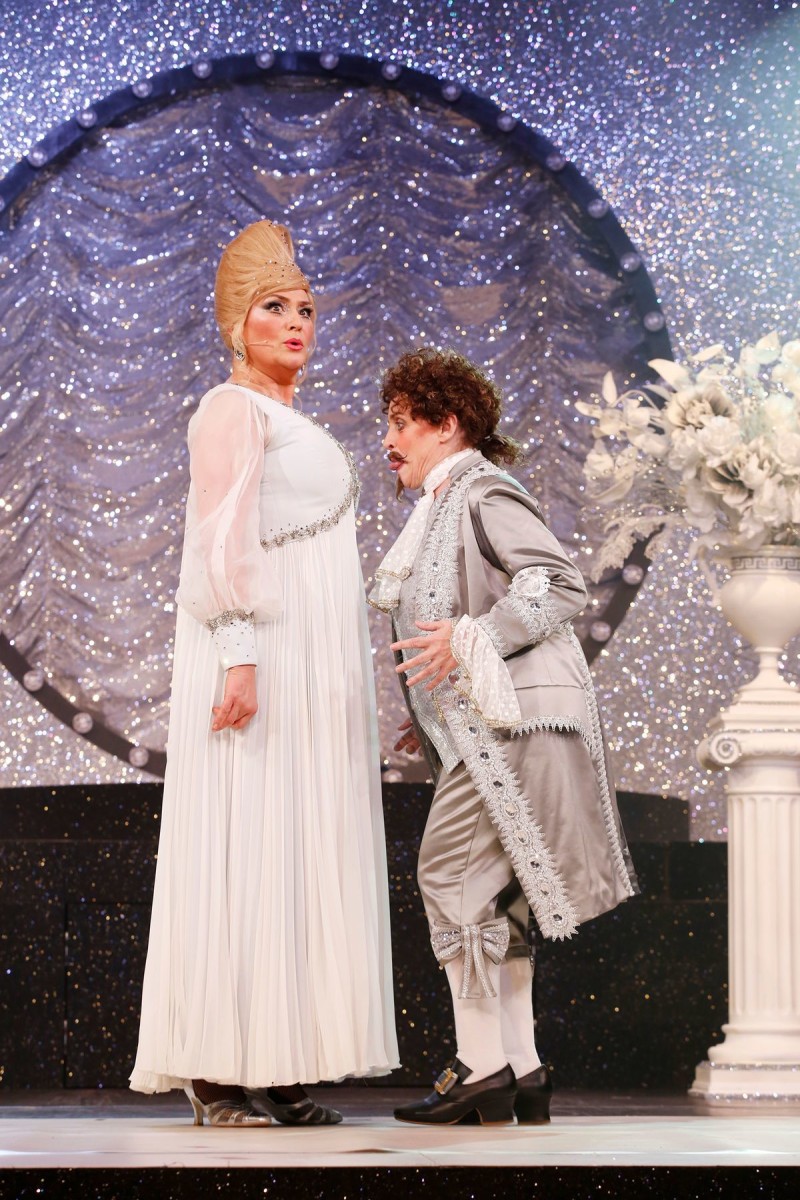
Andreja Schneider (l.) and Katharina Thalbach as Prince Sternschnuppe in “Frau Luna” at Tipi am Kanzleramt. (Photo: Barbara Braun/MuTphoto)
Andreja added, “They might hire cabaret artists like Geschwister Pfister for some smaller roles, as a special treat, but use their opera ensemble for the main roles, singing and performing as always. Few state theaters dare to go all the way, like Tipi does with Frau Luna, because there every actor/actress is hand-picked and unconventional. That’s why it’s such a big success.”
It’s not that such things couldn’t happen anywhere else, or that they wouldn’t be liked outside of Berlin by audiences in the so called provinces, but theater directors there are usually too timid to try. “So, yes, we are blessed here in Berlin to have so many venues today, from Tipi to Komische Oper to Neuköllner Oper to Gorki Theater, not to forget the Bar jeder Vernunft were Rössl was done in 1994. It’s like operetta heaven.”
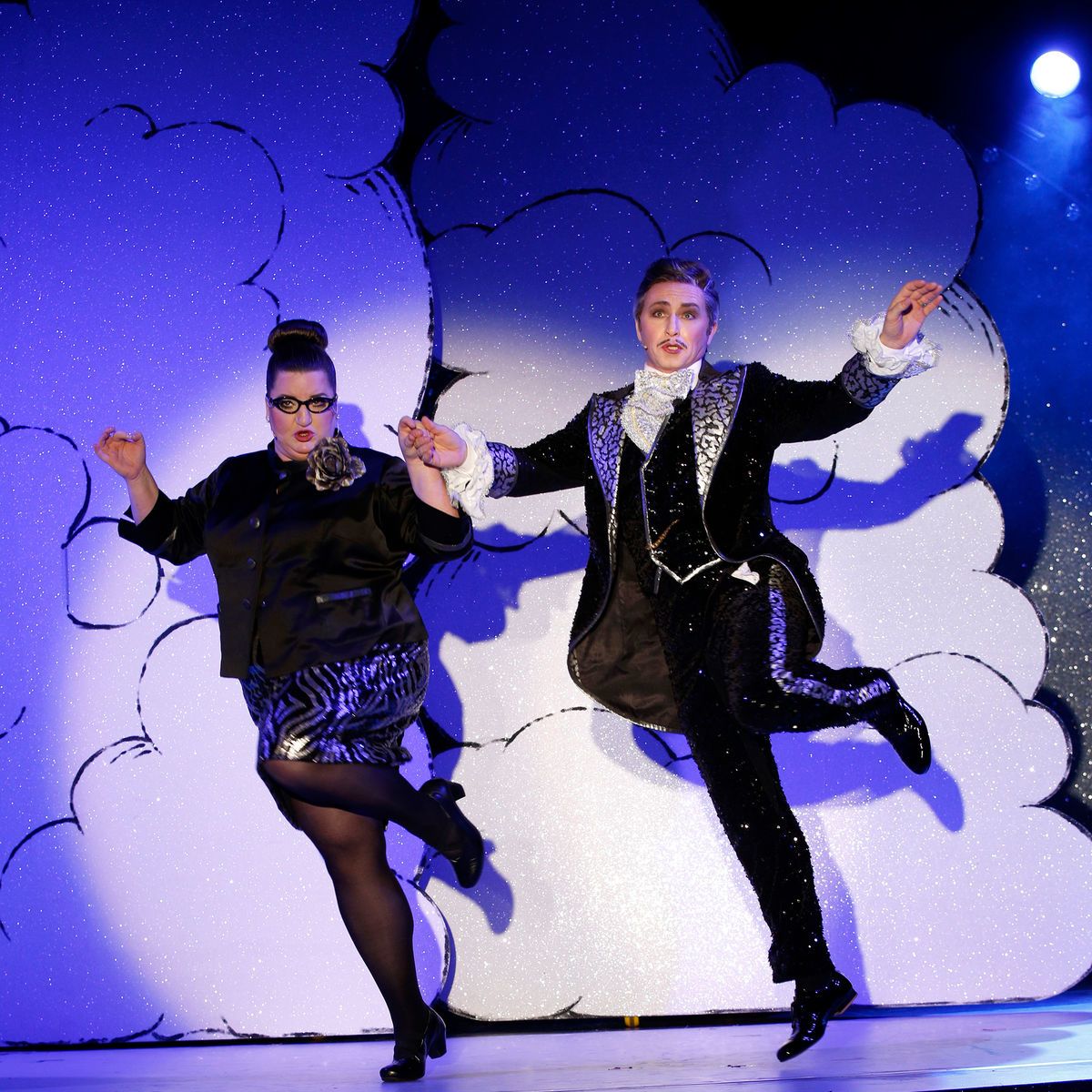
Anna Mateur (l.) and Tobias Bonn as special moon agents in “Frau Luna” at Tipi am Kanzleramt. (Photo: Barbara Braun)
In Frau Luna, the space travelers land on the moon to discover an utopian world, as the libretto states. In the production by Bernd Mottl, this utopia looks like a glitzy TV studio from the 1970s where Anneliese Rothenberger and Ingeborg Hallstein reigned supreme. Isn’t that the opposite of the queerfeminist utopia the authors might have had in mind? “No, no, no,” said Christoph Marti, “this 1970s studio atmosphere is what’s so subversive today. When we were children, we didn’t want to see Anneliese Rothenberger and her chiffon dresses, singing in this strange way in her TV broadcasts. It was all so depressingly prissy and silly. But when you look at it today, it’s almost fetish. It’s kinky.” Andreja adds, “We have a new relationship to all this old fashioned studio business in our digital age, where nothing is real anymore, it’s much more provocative to have such an old fashioned studio than doing something contemporary involving smart phones and Syria.”
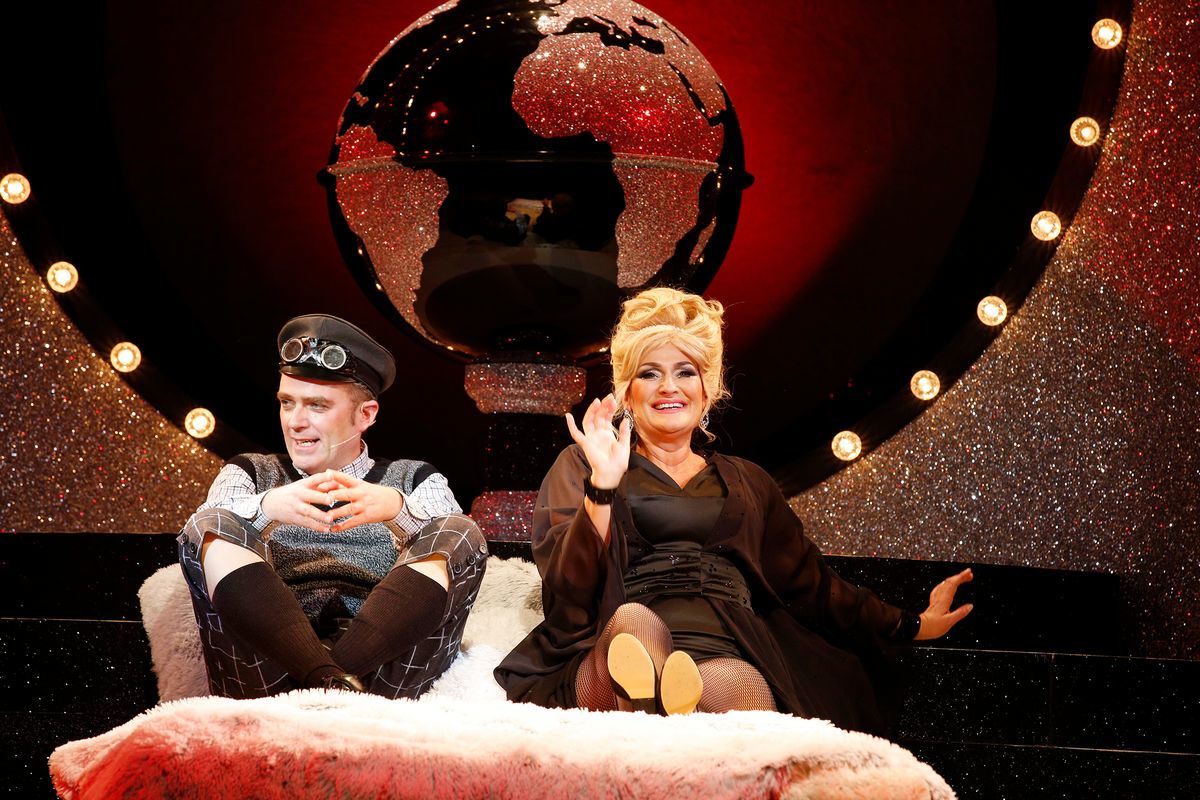
Benedikt Eichhorn (l.) in bed with Andreja Schneider in “Frau Luna” at Tipi am Kanzleramt. (Photo: Barbara Braun)
When asked what they can be seen in next, they mentioned a Fledermaus production in Switzerland 2018, and Ball im Savoy in Nuremberg, at the opera house, in early 2019. “That Nuremberg opened their doors for us and our way of performing Ábrahám is definitely the result of the operetta renewal that has sweept Germany. This would not have been imaginable a decade ago.” Tobias Bonn will perform the tenor lead of Aristide, Christoph Marti will be Daisy Darlington, the jazz singer, and Andreja will play Daisy’s love interest, Turkish Ambassador Mustafa Bey. So there’s double cross-dressing and a different way of handling the show than in Berlin in Kosky’s own production.
Many critics in Berlin have reacted with surprising homophobia to Kosky’s cross-dressing spectacles, as if the phenomenon were ‘only for gays’ and not enjoyable for everyone else. Also, the lament about the half-nude male dancers at Komische Oper has never stopped, a lament uttered mostly by heterosexual male critics, not by females. Is this homophobia in the press something the Geschwister Pfister also face when playing operetta? “There’s no point getting upset about this,” said Christoph. “It’s just the way some people think. When critics saw me as Sylva Varescu in Cologne and wrote ‘But one cannot sing Kálmán like this,’ that’s their opinion, which I respect. Kálmán’s daughter Yvonne, who saw the performances, loved it, as did most people in the audience. And I loved playing Sylva. In the end that counts more than a negative review. Even if I’d prefer reading how great I was, obviously. But I don’t want to waste energy arguing with these nay-sayers.”
Andreja Schneider sums things up by saying, “I believe people need to loosen up, especially opera people. Some of them, mostly critics, can be incredibly fundamental. Their seriousness is not my cup of tea. As if everything were carved in stone and no changes in performance style would ever be permitted. I shudder just thinking about such fanatics. We would never have had any innovation with such an approach.”
After the talk, many visitors went to take a look at the 12 Moons film lounge, had their photo taken with the Geschwister Pfister, and discussed when to go see Frau Luna which runs till 11 March, 2018, every night except Mondays.
For more information on 12 Moons, click here. For performance dates of Frau Luna, click here.
